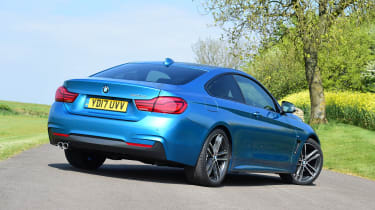BMW 4 Series coupe (2013-2020)
"The BMW 4 Series is a great choice for keen drivers who are after a stylish executive coupe"
Pros
- Great range of engines
- High-quality interior
- Fantastic to drive
Cons
- A bit pricey
- 3 Series is more practical
- Ride could be more comfortable
If the BMW 4 Series name is unfamiliar, then think of it as the coupe version of the (previous-generation) BMW 3 Series - a new 4 Series is due in late 2020. The change was brought about as BMW moved to reserve odd numbers for saloons like the 3 Series, 5 Series and 7 Series, while coupe and convertible models such as the BMW 2 Series and BMW 8 Series are given even numbers - with the notable exception of the BMW 2 Series Active Tourer and Gran Tourer MPVs.
The 4 Series was thoroughly updated in 2017 and it’s had subtle tweaks since then to keep it fresh in the fight against the Audi A5 Coupe, Mercedes C-Class Coupe and Lexus RC.
The changes have done nothing to blunt the 4 Series’ sharp design and although it’s claimed that 2,500 components were changed, the differences aren’t immediately obvious. Full-LED headlamps give the game away, though, as do subtly reshaped front and rear bumpers, along with a choice of redesigned alloy wheels. BMW also made a broader and more vivid range of colours available for the car.
Attention was also paid to ensuring that the 4 Series is sharper than ever, building on its already involving rear-wheel-drive handling – or four-wheel drive if you need extra grip and choose the xDrive system. All versions place a real emphasis on sportiness, but this comes at the cost of some comfort: the ride is firm, even with the adaptive suspension in its most relaxed setting. If you prioritise comfort, the Lexus RC or C-Class Coupe will be more cosseting.
More reviews
As this is a BMW, there’s no shortage of engine choices, whether your preference is an efficient diesel or a powerful petrol. In fact, power spans all the way from 187bhp from the 2.0-litre diesel BMW 420d to 322bhp in the twin-turbocharged 3.0-litre petrol BMW 440i, which is a genuinely fast car. There’s also an even quicker BMW M4 performance model, which we’ve reviewed separately.
The 420d is our favourite all-rounder, though – it blends a 7.4-second 0-62mph-time with 49.6mpg fuel economy if you drive gently, compared to 38.2mpg for the similarly powerful 420i petrol. In contrast, the 322bhp 440i is a genuine sports car and gets from 0-62mph in 5.4 seconds, but returns under 35mpg. The two-wheel drive 420i and 420d models can be specified with a manual or automatic gearbox, while all other models are auto-only.
Trim levels have now been cut to just Sport and M Sport, with both benefiting from LED headlights, two-zone auto air conditioning, 18-inch alloys, BMW ConnectedDrive with navigation and online services, and heated sports seats. M Sport gives the 4 Series a racier look, thanks to styling tweaks inside and out. It also includes the upgraded media package and a different instrument cluster.
In the transition to a two-door coupe, the 4 Series has lost some rear passenger room and getting to the rear seats is far trickier than in the BMW 3 Series saloon. The boot has shrunk to 445 litres too, although that’s still quite sizeable, beating the C-Class Coupe and providing more luggage space than most family hatchbacks.
While Euro NCAP hasn’t crash-tested the 4 Series specifically, the near-identical 3 Series scored the full five stars when it was scrutinised in 2012. The BMW 4 Series finished 22nd out of the cars ranked in our 2017 Driver Power owner satisfaction survey of cars currently on sale in the UK. The news was not so good in 2019, however, with the 4 Series dropping to 96th place out of 100 cars ranked, while it failed to appear in 2020's results.












